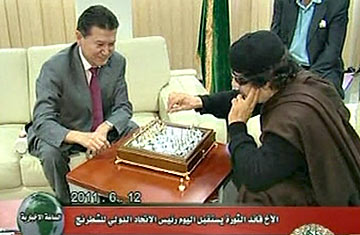
In a still image taken from a video broadcast on Libyan state television, Libyan leader Moammar Gaddafi plays chess with Kirsan Ilyumzhinov, the president of the International Chess Federation in Tripoli, June 12, 2011.
When the U.S. and France asked Russia last month to help mediate the war in Libya, they were probably not expecting a self-proclaimed emissary of alien life to show up in Tripoli for a meeting with Muammar Gaddafi. But on Sunday evening, as NATO air strikes continued on the Libyan capital, the besieged Colonel took the time to entertain a Russian politician named Kirsan Ilyumzhinov, best known for his claims that extraterrestrials took him on a mystical tour of the galaxy in their spaceship in 1997. Far from convincing Gaddafi to step down, the visit seemed geared toward giving him a confidence boost — and an unlikely lesson in the game of kings.
For the past 15 years, Ilyumzhinov has also presided over the world chess federation, known as FIDE, which makes him the first head of an international body to meet with Gaddafi since the U.N.-backed bombing campaign against him began in March. In a video shown on Libyan television on Sunday night, Ilyumzhinov praises Gaddafi's resilience. "It's a great honor for me to be here to see that you are very well, healthy, because many people... gave wrong information," he said in stilted English.
The two men then played a rather awkward game of chess. Allowed the first move, Gaddafi made a clumsy opening, nervously moving his pawn from F3 to F4, and Ilyumzhinov took the piece and moved it back for him. The game ended in a draw and a handshake for the cameras, after which Ilyumzhinov told reporters that Gaddafi had promised never to leave Libya, regardless of the West's support for the rebels battling to overthrow him. The two-hour chat, Ilyumzhinov said, was held not in an underground bunker, where many western experts had presumed Gaddafi to be hiding, but in "one of the administrative buildings in the Libyan capital."
The two-day visit, billed as an attempt to promote chess in Libya, had a clear diplomatic tint that seemed at cross-purposes with Russia's much-touted drive to mediate an end to Libyan conflict. On May 27, U.S. President Barack Obama asked his Russian counterpart Dmitri Medvedev to help convince Gaddafi to cede power. The next week, Medvedev dispatched his Africa envoy, Mikhail Margelov, who told a news conference in the rebel stronghold of Benghazi on June 7 that Gaddafi must step down, as he "has lost his legitimacy after the first bullet shot against the Libyan people." But last week, Margelov returned to Moscow without ever meeting with Gaddafi.
Ilyumzhinov has now beaten him to it, a move that would have been unlikely, given its geopolitical significance, without at least tacit approval from the Kremlin. On Monday, Margelov, the Africa envoy, said he had discussed Ilyumzhinov's trip to Libya with him beforehand. "I advised him to play white, start with E2 to E4, and let Gaddafi know that his match is approaching the endgame," Margelov said on Monday.
But if anything, Ilyumzhinov gave Gaddafi some badly needed encouragement, much as he had done by praising Iraqi dictator Saddam Hussein during the U.S. invasion of Iraq in 2003. In an October interview with TIME, Ilyumzhinov said Hussein had been "a dear friend" whom he sorely missed, and he went on to denounce the West for pushing its values onto other countries — a very popular view among the Russian public and much of Moscow's political elite. "The western man is primitive in his thinking," Ilyumzhinov said. "If something doesn't fit into his scheme, even if it is an idea that is new and useful, it is easier to write it off as corrupt or insane."
Ilyumzhinov served as the head of the Russian republic of Kalmykia between 1993 and 2010. Four years into his tenure, which was stained by frequent allegations of corruption and mismanagement, he began to claim that he had been kidnapped by aliens who taught him how to save mankind from certain destruction. The planet Earth, he told TIME in October, was set to collide with the planet Nebiru, killing everyone on the planet, unless people cleansed their "aura" by playing more chess. The game would also allow humans to regain the powers of teleportation and telekinesis, which ancient civilizations possessed, Ilyumzhinov says.
None of his eccentricities, however, ever seemed to hurt his standing with the Kremlin. In 2005, then-President Vladimir Putin appointed Ilyumzhinov to another five-year term as the leader of Kalmykia, a poor and mostly Buddhist region in southern Russia, and Ilyumzhinov has been a dogged Putin ally ever since. In 2010, Ilyumzhinov struck a deal with the Kremlin to leave office, and was rewarded with Russia's support for his bid to get re-elected as the head of FIDE last year.
In his interview with TIME, he said he preferred the FIDE presidency to his governor's seat, because it was a global platform that allowed him to travel the world and meet with world leaders. "FIDE is very helpful in getting my messages across," he said. At the time, Ilyumzhinov was referring to the messages he says he learned from extraterrestrials. But on Sunday, his role as FIDE president allowed him to send the world another message: Gaddafi still has a few friends left on this planet and the Libyan strongman had no intention of giving up power. For the western powers eager to see Gaddafi deposed, it may have been better if Ilyumzhinov had stuck to his work on intergalactic conflicts and stayed clear of the earthly ones now unfolding in North Africa.
